Enjoy the fascinating work of artist Kate Vrijmoet, who uses water as a visual, and visceral, part of her portfolio. Be sure to visit her website for more.
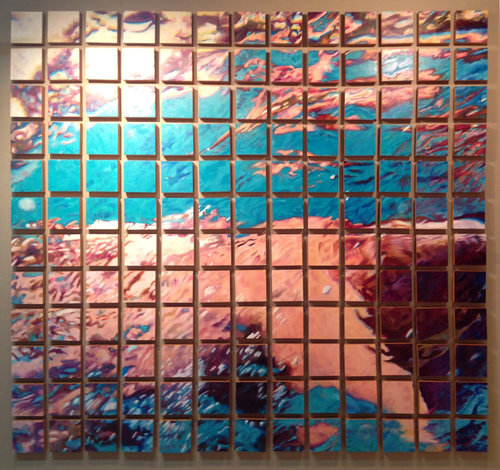
“In Praise of Water” 6′ x 6.5′, made up of 156 six-inch oil on panel paintings.
My paintings, social art and installations focus on the human body and the human condition, and on issues of consciousness, boundaries, scale and access. My mission has always been to set the stage for the audience to have an experience they might not otherwise have. They bring themselves and their past experiences with which to interpret that new circumstance.
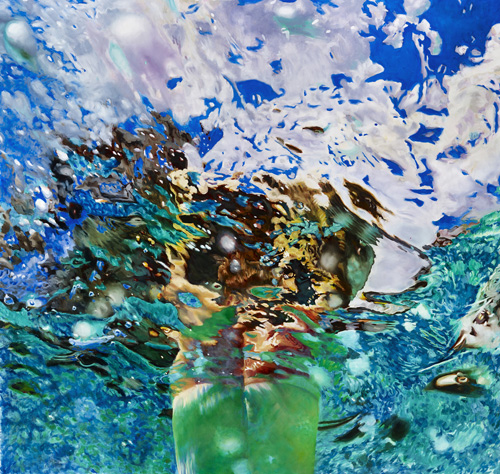
“And the vacuum cleaner swallows its bag” Oil on canvas, 72″ x 84″
The artist Olaffur Eliasson adds, “it’s the viewers’ responsibility to have an experience.” I take pleasure in making discoveries and learning. The deepest satisfaction I receive is in sharing my work. The work I create is not a painting—it’s an experience, even when the physical form manifests as a painting.
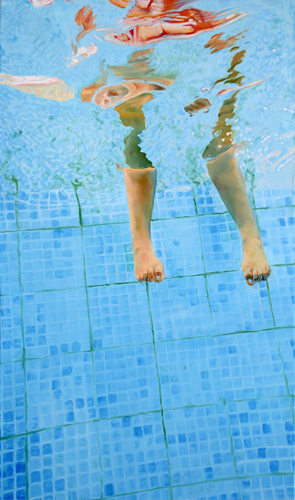
“I’ve been here all my life, still I’m somewhere else” Oil on canvas, 82″ x 48″
I use the tools of classical painting to provoke emotions in my audience they might more often associate with theater. I feel that paintings can be engulfing and involving. My aim is an extremely high impact experience for the viewer. Many of the deepest and most unusual experiences of all kinds in art are only available because the artist has led you to them through emotions that are provocative but, at least at first, acceptable.
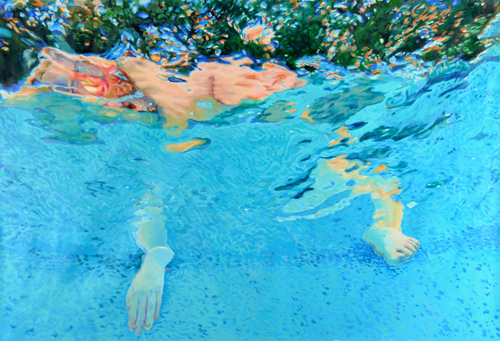
“A need so great and deep it can never be swallowed” Oil on canvas, 66″ x 102″
The true work of art, Kandinsky observed, “detaches itself from the artist and takes on its own life, becoming an independent being animated with spiritual breath.” In my work I do not so much accede to this as seek it. How can it be any other way? Art connects us. It tells us we’re human, we’re like each other, we feel. It’s my mission as a person and my job as an artist to bring about situations through art where this can happen. If art teaches us something about the world we live in, it’s that we must reach out to others, that to dig deeper reaps rewards, and that we share the human condition.
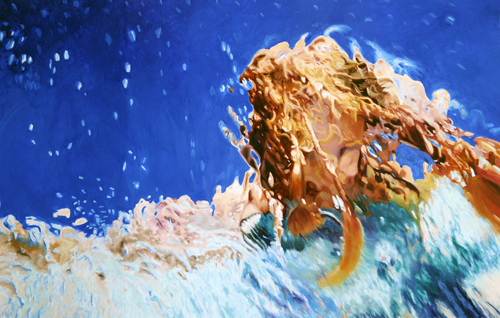
“What you get is to be changed. More and more by each glistening minute.” Oil on canvas, 80″ x 125″
In these paintings water represents the physical manifestation of the aural. Among other things these paintings are about sound and how the brain processes sound. My goal is that you hear the paintings.
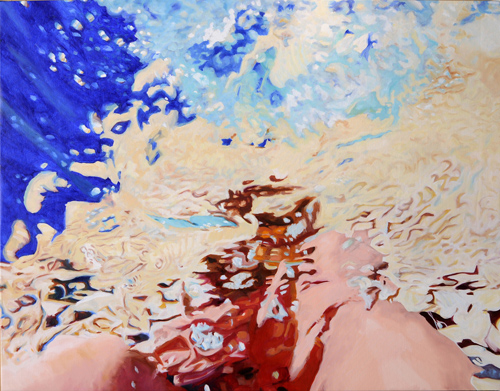
“Last night I dreamt again of thrashing, and you on the far shore.” Oil on canvas, 45″ x 54″
While the colors are relaxing, assisting the viewers’ experience, perhaps the most significant factor is our own brain functions. In experiments on mirror neurons, fMRI imaging of the right frontal cortex shows increased activity with the key finding being that we’re affected by motivation. What I see you do and your motivation behind it, affects me on a neurological level. Mental imagery has the same effect; it triggers what we know about the world in our mirror neurons.
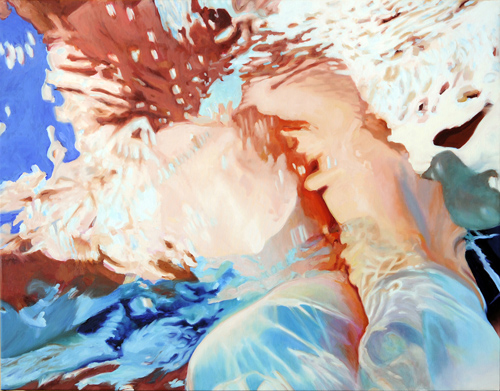
“Remember, ours is the animal eye” Oil on canvas, 45″ x 54″
When I carry this a step further and place it squarely in the realm of art, it suggests art stimulates you because a “functional link exists between my brain and yours.” When you look at the images of the underwater scenes your brain, your cognitive unconscious stimulates those parts of your brain that tell you what you know to be true about being underwater.
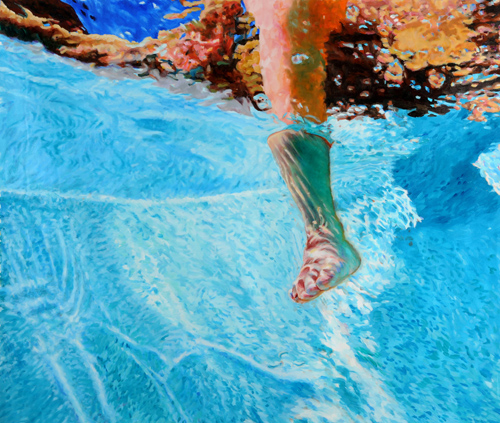
“The rest is a faint echo” Oil on canvas, 54″ x 63″
In this case, sound is such a big part of being under water that the premotor cortex, where sound is associated, is dominant. Since our brains are not good multi-taskers, it has to decide which area receives the stronger signals—the occipital lobe, which is primarily responsible for eyesight, or the premotor cortex? I posit that the images are processed in the ventral premotor cortex.
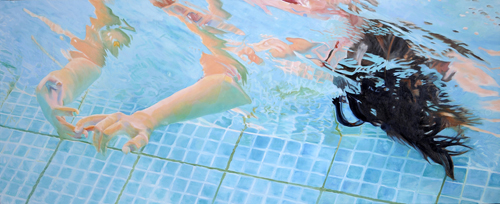
“And its charms have a punch. And its hunches have arms” Oil on canvas, 44″ x 108″
All of the titles come from poetry. I feel connected to poetry because poetry, like fine art, reminds us we’re human, we’re connected, we’re like each other. And, poetry is aural. I think poems need to be read aloud.
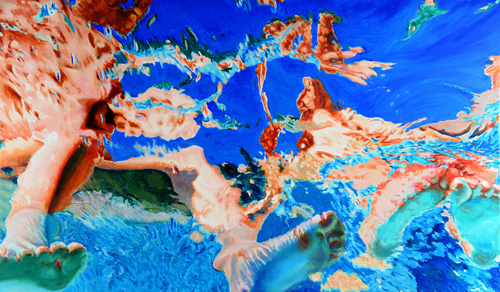
“Creation {of Melancholy Fate} by Supreme Being” Oil on canvas, 66″ x 102″
We are living in an anxious era. The central idea of the Non-ordinary Reality (water) paintings is to give voice to the unscreamed scream, to what has been silent and demands to be heard — so that my point of departure is one highly charged with anxiety but also with the promise of breaking through.
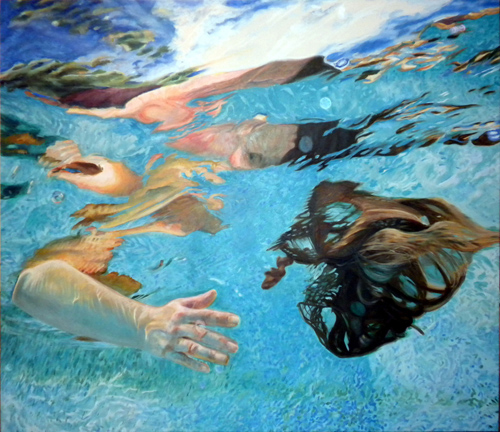
“Forgetting and remembering in the same instant” Oil on canvas, 72″ x 84″
Water is a metaphor, both for keeping afloat and for a tide of change. The way that water alters gesture, conferring ambiguity and disguise but ultimately revealing all, suggests the necessity of opening our eyes under water, learning to see through moving water. Warren Buffet remarked that when the tide goes out, we find out who has been swimming naked. Amid fear and loss and disorientation, we are signaling wildly; this could be a time for making new connections and building new strengths.
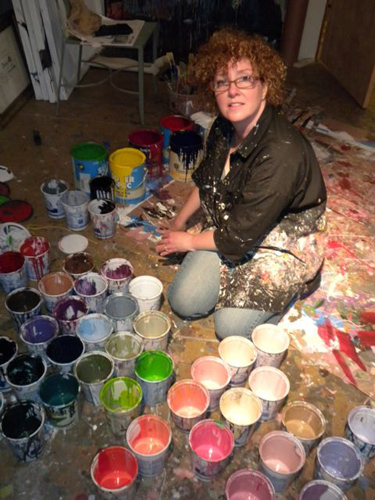
The artist Kate Vrijmoet in her studio.
In 2012 I was honored to be one of 16 American artists participating in the 2012 5th Beijing International Biennial. My sound installation, Mother May I…? was awarded Best Installation in the Brooklyn Wide Open exhibit by Charlotta Kotik, Curator Emerita Brooklyn Museum of Art. And, it was exhibited at Orange County Center on Contemporary Art–a show endorsed by Nicolas Bourriaud. In 2010, CoCA Seattle published a 42-page catalog for my solo show, Kate Vrijmoet: Essential Gestures.
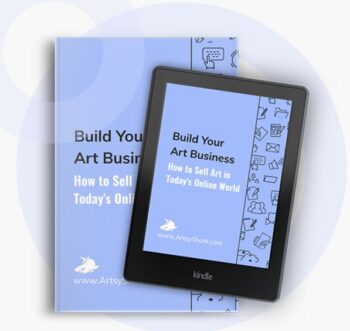
Speak Your Mind